新概念英语语法总结:一般将来时
一般将来时语法知识点
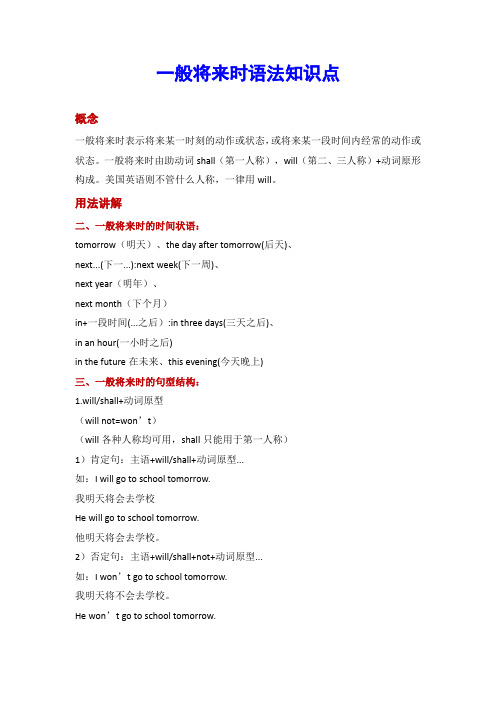
一般将来时语法知识点概念一般将来时表示将来某一时刻的动作或状态,或将来某一段时间内经常的动作或状态。
一般将来时由助动词shall(第一人称),will(第二、三人称)+动词原形构成。
美国英语则不管什么人称,一律用will。
用法讲解二、一般将来时的时间状语:tomorrow(明天)、the day after tomorrow(后天)、next...(下一...):next week(下一周)、next year(明年)、next month(下个月)in+一段时间(...之后):in three days(三天之后)、in an hour(一小时之后)in the future在未来、this evening(今天晚上)三、一般将来时的句型结构:1.will/shall+动词原型(will not=won’t)(will各种人称均可用,shall只能用于第一人称)1)肯定句:主语+will/shall+动词原型...如:I will go to school tomorrow.我明天将会去学校He will go to school tomorrow.他明天将会去学校。
2)否定句:主语+will/shall+not+动词原型...如:I won’t go to school tomorrow.我明天将不会去学校。
He won’t go to school tomorrow.他明天将不会去学校。
3)一般疑问句:Will/Shall+主语+动词原型...如:Will you go to school tomorrow?你明天要去学校吗?Will he go to school tomorrow?他明天要去学校吗?肯定回答:Yes,主语+will.如:Yes,I will.Yes,he will.否定回答:No,主语+will+not.如:No,I won’t.No,he won’t.4)特殊疑问句:特殊疑问词+will/shall+主语+动词原型... 如:What will you do tomorrow?你明天将会做什么?What will he do tomorrow?他明天将会做什么?2.be going to+动词原型1)肯定句:主语+be going to+动词原型...如:I am going to buy some books tomorrow.我明天打算去买一些书。
新概念英语第1册第91-92课课重点语法
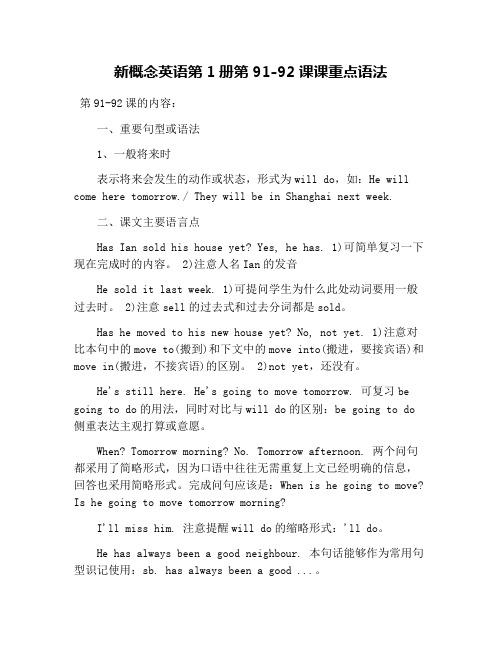
新概念英语第1册第91-92课课重点语法第91-92课的内容:一、重要句型或语法1、一般将来时表示将来会发生的动作或状态,形式为will do,如:He will come here tomorrow./ They will be in Shanghai next week.二、课文主要语言点Has Ian sold his house yet? Yes, he has. 1)可简单复习一下现在完成时的内容。
2)注意人名Ian的发音He sold it last week. 1)可提问学生为什么此处动词要用一般过去时。
2)注意sell的过去式和过去分词都是sold。
Has he moved to his new house yet? No, not yet. 1)注意对比本句中的move to(搬到)和下文中的move into(搬进,要接宾语)和move in(搬进,不接宾语)的区别。
2)not yet,还没有。
He's still here. He's going to move tomorrow. 可复习be going to do的用法,同时对比与will do的区别:be going to do侧重表达主观打算或意愿。
When? Tomorrow morning? No. Tomorrow afternoon. 两个问句都采用了简略形式,因为口语中往往无需重复上文已经明确的信息,回答也采用简略形式。
完成问句应该是:When is he going to move? Is he going to move tomorrow morning?I'll miss him. 注意提醒will do的缩略形式:'ll do。
He has always been a good neighbour. 本句话能够作为常用句型识记使用:sb. has always been a good ...。
一般将来时态知识点详解(初中英语专项复习) (4)
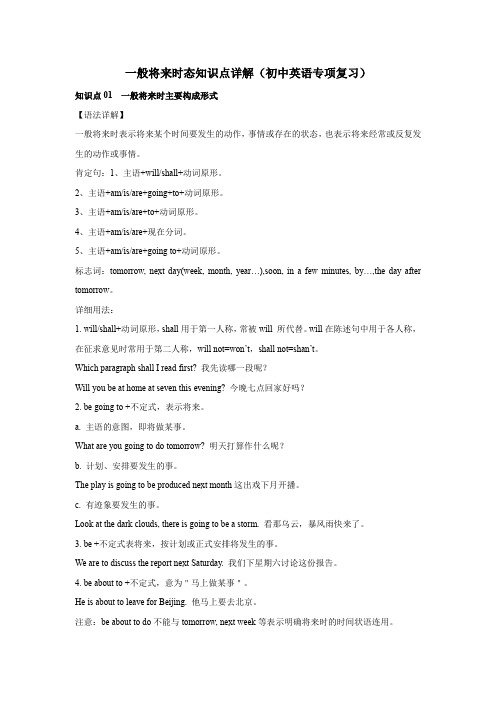
一般将来时态知识点详解(初中英语专项复习)知识点01 一般将来时主要构成形式【语法详解】一般将来时表示将来某个时间要发生的动作,事情或存在的状态,也表示将来经常或反复发生的动作或事情。
肯定句:1、主语+will/shall+动词原形。
2、主语+am/is/are+going+to+动词原形。
3、主语+am/is/are+to+动词原形。
4、主语+am/is/are+现在分词。
5、主语+am/is/are+going to+动词原形。
标志词:tomorrow, next day(week, month, year…),soon, in a few minutes, by…,the day after tomorrow。
详细用法:1. will/shall+动词原形,shall用于第一人称,常被will 所代替。
will在陈述句中用于各人称,在征求意见时常用于第二人称,will not=won’t,shall not=shan’t。
Which paragraph shall I read first? 我先读哪一段呢?Will you be at home at seven this evening? 今晚七点回家好吗?2. be going to +不定式,表示将来。
a. 主语的意图,即将做某事。
What are you going to do tomorrow? 明天打算作什么呢?b. 计划、安排要发生的事。
The play is going to be produced next month这出戏下月开播。
c. 有迹象要发生的事。
Look at the dark clouds, there is going to be a storm. 看那乌云,暴风雨快来了。
3. be +不定式表将来,按计划或正式安排将发生的事。
We are to discuss the report next Saturday. 我们下星期六讨论这份报告。
一般将来时知识点总结
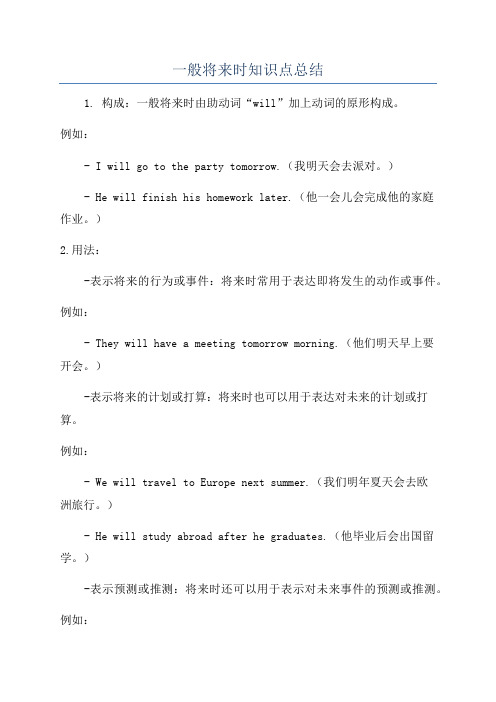
一般将来时知识点总结1. 构成:一般将来时由助动词“will”加上动词的原形构成。
例如:- I will go to the party tomorrow.(我明天会去派对。
)- He will finish his homework later.(他一会儿会完成他的家庭作业。
)2.用法:-表示将来的行为或事件:将来时常用于表达即将发生的动作或事件。
例如:- They will have a meeting tomorrow morning.(他们明天早上要开会。
)-表示将来的计划或打算:将来时也可以用于表达对未来的计划或打算。
例如:- We will travel to Europe next summer.(我们明年夏天会去欧洲旅行。
)- He will study abroad after he graduates.(他毕业后会出国留学。
)-表示预测或推测:将来时还可以用于表示对未来事件的预测或推测。
例如:- It will rain tomorrow.(明天会下雨。
)3.特殊用法:- be going to:此结构用于表示对未来的计划或打算,意义与一般将来时相近。
例如:- They are going to get married next month.(他们下个月打算结婚。
)- She is going to start a new job next week.(她下周将开始新的工作。
)- be about to:此结构用于表示即将发生的行为或事件,常含有紧迫感。
例如:- The show is about to begin.(演出即将开始。
)- I am about to leave for the airport.(我即将出发去机场。
)4.时间和条件状语:-时间状语:一般将来时常常与时间状语连用,表示动作发生的时间。
例如:tomorrow(明天)、next week(下周)、in the future(将来)-条件状语:一般将来时也可以与条件状语连用,表示其中一种条件下的将来动作。
新概念英语第一册语法知识点
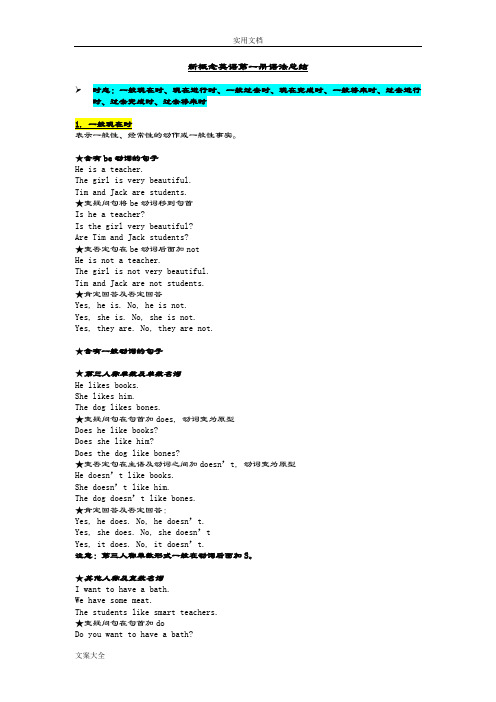
新概念英语第一册语法总结时态:一般现在时、现在进行时、一般过去时、现在完成时、一般将来时、过去进行时、过去完成时、过去将来时★含有be动词的句子He is a teacher.The girl is very beautiful.Tim and Jack are students.★变疑问句将be动词移到句首Is he a teacher?Is the girl very beautiful?Are Tim and Jack students?★变否定句在be动词后面加notHe is not a teacher.The girl is not very beautiful.Tim and Jack are not students.★肯定回答及否定回答Yes, he is. No, he is not.Yes, she is. No, she is not.Yes, they are. No, they are not.★含有一般动词的句子★第三人称单数及单数名词He likes books.She likes him.The dog likes bones.★变疑问句在句首加does, 动词变为原型Does he like books?Does she like him?Does the dog like bones?★变否定句在主语及动词之间加doesn’t, 动词变为原型He doesn’t like books.She doesn’t like him.The dog doesn’t like bones.★肯定回答及否定回答:Yes, he does. No, he doesn’t.Yes, she does. No, she doesn’tYes, it does. No, it doesn’t.注意:第三人称单数形式一般在动词后面加S。
★其他人称及复数名词I want to have a bath.We have some meat.The students like smart teachers.★变疑问句在句首加doDo you want to have a bath?Do we have any meat?Do the students like smart teachers?★变否定句在主语和动词之间加don’t.You don’t want to have a bath.We don’t have any meat.The students don’t like smart teachers.★肯定回答及否定回答Yes, I do. No, I don’t.Yes, we do. No, we don’tYes, they do. No, they don’t.构成:主语+be动词+动词的现在分词+其它成分We are having lunch.He is reading a book.The dog is running after a cat.The boys are swimming across the river.★变疑问句将be动词移到句首Are we having lunch?Is he reading a book?Is the dog running after a cat?Are the boys swimming across the river?★变否定句在be动词后面加notWe are not having lunch.He is not reading a book.The dog is not running after a cat.The boys are swimming across the river.★特殊疑问句:what, which, how, where, who, etc.疑问词+be动词+主语+现在分词What are you doing?What is she doing?What is the dog doing?没有进行时的动词(必背)表示状态、思想、感情、感觉的动词不能表示正在进行的动作1. 表示感觉、感官的词see, hear, like, love, want2. have, has作为动词”拥有”的含义时,没有进行时常和表示过去的时间状语连用,如yesterday, last night, the day before yesterday, three days ago.含有be动词的句子,将动词变为过去式,am / is的变为was,are的变为wereI was at the butcher’s.You were a student a year ago.The teacher was very beautiful ten years ago.★变疑问句将be动词移动到句首Were you at the butcher’s?Were you a student a year ago?Was the teacher very beautiful ten years ago?★变否定句在be动词后面加notI was not at the butcher’s.You were not a student a year ago.The teacher was not very beautiful ten years ago.★肯定回答否定回答Yes, I was. No, I was not.Yes, you were. No, you were not.Yes, he/she was. No, he/she was not.★特殊疑问句:What did you do?不含有be动词的句子,将动词变为过去式,动词过去式构成见附录I finished my homework yesterday.The boy went to a restaurant.The Sawyers lived at King Streeta year ago.King Streeta year ago.★变疑问句在句首加did,动词变为原型Did you finish your homework yesterday?Did the boy go to a restaurant?Did the Sawyers live at King Streeta year ago?King Streeta year ago?★变否定句在主语和动词之间加did not,动词变为原型I did not finish my homework yesterday.The boy did not go to a restaurant.The Sawyers did not live at King Streeta year ago.King Streeta year ago.★肯定回答及否定回答Yes, I did. No, I didn’t.Yes, he did. No, he didn’t.Yes, they did. No, they did not.have/has+过去分词用法:1)表示过去发生且和现在有某种联系的动作,常和just, usually, already, since等时间副词连用I have just had lunch. (饱了,不用再吃了)He has had a cup of tea.(不渴了,不用再喝)They have already had their holiday. (不能再度假了)The boy has already read the book. (已经知道书的内容了,不用再看了)2)询问别人是否做过某事一般用现在完成时Have you finished your homework?Have you been to Beijing?Have he seen the film?3)表示开始于过去并持续到现在的动作I have lived in Beijing for twenty years.I have worked for this school for 1 year.4)表示一种经历、经验:去过…地方,做过…事情,经历过…事情I have never had a bath.I have never seen a film.I have never been to cinema.I have ever been to Paris.Have been to表示去过,have gone to 表示去了I have been to London.(人已经回来)He has gone to London.(人还在那里)5)表示一种结果,一般不和时间副词联用I have lost my pen.I have hurt myself.He has become a teacher.She has broken my heart.句型变化:★变疑问句将助动词移到句首,变否定句在助动词后面加not.Have you lost your pen? I have not lost my pen.★肯定回答及否定回答Yes, I have. No, I have not.★特殊疑问句:What have you done?What has he done?一般过去时与现在完成时的区别:凡是有明确的表示过去的时间状语的句子为过去时注意:有些动词表示的动作有一个终点,不能再延续,因此不能和表示一段时间状语连用错:I’ve left Beijing for 3 days.对:I left Beijing 3 days ago. I have been away from being for 3 days.经常和tomorrow, next year, the day after tomorrow, the year after the next, in five hours’ time, etc. 表示将来的词联用结构:主语+助动词will+动词原形I will go to America tomorrow.The pilot will fly to Japan the month after the next.Jack will move into his new house tomorrow morning.★变疑问句将助动词移到句首Will you go to America tomorrow?Will the pilot fly to Japan the month after the next?Will Jack move into his new house tomorrow morning?★变否定句在助动词后面加notI will not go to America tomorrow.The pilot will not fly to Japan the month after the next.Jack will not move into his new house tomorrow morning★肯定回答及否定回答Yes, I will. No, I will not.Yes, he/she will. No, he/she will not.Yes, he will. No, he will not.★特殊疑问句:What will you do?结构:had+过去分词After she had finished her homework, she went shopping.They had sold the car before I asked the price.The train had left before I arrived at the station.After/before引导的时间状语从句放在句首要在句子后面加逗号,如果放在主句后则不用。
一般将来时知识点总结
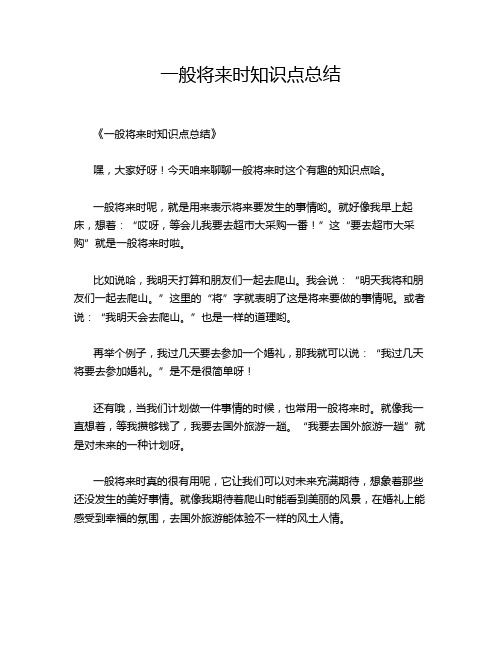
一般将来时知识点总结
《一般将来时知识点总结》
嘿,大家好呀!今天咱来聊聊一般将来时这个有趣的知识点哈。
一般将来时呢,就是用来表示将来要发生的事情哟。
就好像我早上起床,想着:“哎呀,等会儿我要去超市大采购一番!”这“要去超市大采购”就是一般将来时啦。
比如说哈,我明天打算和朋友们一起去爬山。
我会说:“明天我将和朋友们一起去爬山。
”这里的“将”字就表明了这是将来要做的事情呢。
或者说:“我明天会去爬山。
”也是一样的道理哟。
再举个例子,我过几天要去参加一个婚礼,那我就可以说:“我过几天将要去参加婚礼。
”是不是很简单呀!
还有哦,当我们计划做一件事情的时候,也常用一般将来时。
就像我一直想着,等我攒够钱了,我要去国外旅游一趟。
“我要去国外旅游一趟”就是对未来的一种计划呀。
一般将来时真的很有用呢,它让我们可以对未来充满期待,想象着那些还没发生的美好事情。
就像我期待着爬山时能看到美丽的风景,在婚礼上能感受到幸福的氛围,去国外旅游能体验不一样的风土人情。
哎呀呀,总之呢,一般将来时就是我们展望未来的小工具,让我们的生活变得更加丰富多彩啦!大家可要好好掌握哦,这样就能更好地表达自己对未来的憧憬啦!嘿嘿,就说到这儿咯,大家加油呀!。
一般将来时变化规则

一般将来时变化规则一般将来时是英语中表示将来发生的动作或状态的一种时态。
在句子中,一般将来时通常由助动词“will”或“shall”加上动词原形构成。
除了表示将来的动作或状态,一般将来时还可以用来表示预测、意图、承诺等含义。
在本文中,我们将详细介绍一般将来时的变化规则,以帮助读者更好地掌握这一时态的用法。
首先,让我们来看一下一般将来时的肯定句变化规则。
在肯定句中,一般将来时的结构为“主语 + will/shall + 动词原形”。
例如,“I will go to the park tomorrow.”(我明天会去公园。
)在这个例句中,“I”是主语,“will”是助动词,“go”是动词原形。
需要注意的是,第一人称单数和复数的主语后面可以用“shall”来表示将来时,但在现代英语中,“shall”在口语中很少使用,因此更常见的是使用“will”。
接下来是一般将来时的否定句变化规则。
在否定句中,一般将来时的结构为“主语 + will/shall not + 动词原形”,通常缩写为“won’t”或“shan’t”。
例如,“She will not come to the party.”(她不会来参加派对。
)在这个例句中,“will not”缩写为“won’t”,用来表示将来时的否定形式。
除了肯定句和否定句,一般将来时还可以用来构成疑问句。
疑问句的结构为“Will/Shall + 主语 + 动词原形 + 其他?”例如,“Will you go to the concert with me?”(你会和我一起去听音乐会吗?)在这个例句中,“Will”位于主语“you”之前,用来构成疑问句的结构。
另外,一般将来时还可以用来表示预测、意图、承诺等含义。
例如,“I think it will rain tomorrow.”(我觉得明天会下雨。
)在这个例句中,“will”表示的是根据观察或推测得出的预测。
又如,“I will help you with your homework.”(我会帮你做作业。
【初中英语】初中英语语法大全之一般将来时

【初中英语】初中英语语法大全之一般将来时【—之一般将来时】一般将来时表示将来某一时刻的将要发生动作或状态,或将来某一段时间内经常的动作或状态。
下面就是老师为同学们带来的对一般将来时的详细讲解,供同学们学习的参考。
总结顾名思义,通常将来时则表示将来某一时刻的将要出现动作或状态,或将来某一段时间内经常的动作或状态。
常常和则表示将来的时间状语属格,例如:tomorrow(明天),nextweek(下周),fromnowon(从现在已经开始);inthefuture(将来)等。
一、基本结构及用法1、will/shall+动词原形这种方法一般单纯地表示将来某个时间将要发生的动作或存在的状态。
will用于各种人称will常简略为'll,并与主语连写在一起,如:i'll,he'll,;shall只用于第一人称,在肯定句或否定句中表示将要或不会发生的事情或动作,在疑问句中可以表示建议或征求对方意见。
变否定句在will/shall后加not,缩略形式为won't;变疑问句把will/shall提到主语前。
比如:iwill/shallgotovisithimnextweek.下周我将回去造访他。
whattimeshallwegotheretomorrow?明天我们几点去那儿?2、begoingto动词原形(否定句、疑问句的变化彰显在be动词上)1)表示计划、打算、准备做的事。
比如:wearegoingtoputupabuildinghere.我们急于在这里砌一座楼。
howareyougoingtospendyourholidays?假期你准备怎样过?2)则表示即将出现或确实必须出现的事。
例如:ithinkitisgoingtosnow.我看要下雪了。
3、用现在展开时则表示常见考法对于通常将来时的考查,多以单选、句型切换或词语运用的形式考查学生在具体内容语境中灵活运用时态的能力。
在考试中,可以使大家推论与否该用通常将来时,以及如何恰当采用。
新概念英语第一册所有语法点汇总)
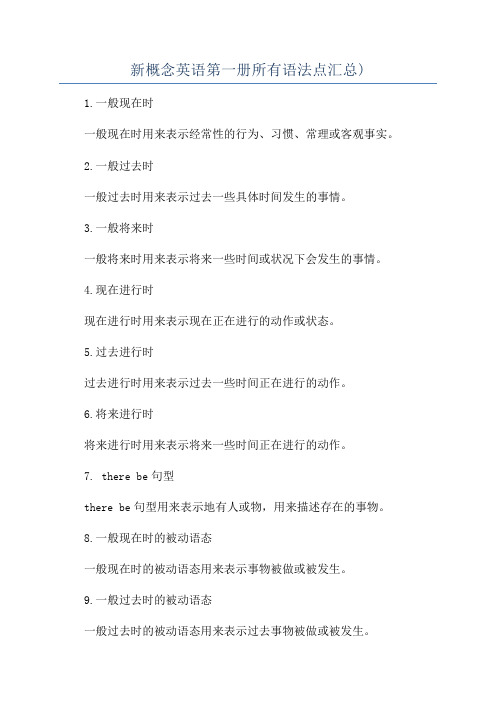
新概念英语第一册所有语法点汇总)1.一般现在时一般现在时用来表示经常性的行为、习惯、常理或客观事实。
2.一般过去时一般过去时用来表示过去一些具体时间发生的事情。
3.一般将来时一般将来时用来表示将来一些时间或状况下会发生的事情。
4.现在进行时现在进行时用来表示现在正在进行的动作或状态。
5.过去进行时过去进行时用来表示过去一些时间正在进行的动作。
6.将来进行时将来进行时用来表示将来一些时间正在进行的动作。
7. there be句型there be句型用来表示地有人或物,用来描述存在的事物。
8.一般现在时的被动语态一般现在时的被动语态用来表示事物被做或被发生。
9.一般过去时的被动语态一般过去时的被动语态用来表示过去事物被做或被发生。
10.一般将来时的被动语态一般将来时的被动语态用来表示将来事物将被做或被发生。
11.现在进行时的被动语态现在进行时的被动语态用来表示事物正在被做或被发生。
12.过去进行时的被动语态过去进行时的被动语态用来表示过去事物正在被做或被发生。
13. do与does的用法do和does用来构成否定句、疑问句和回答。
14.现在完成时现在完成时用来表示过去发生的动作对现在造成的影响或结果。
15.现在完成进行时现在完成进行时用来表示从过去开始一直延续到现在的动作,且这个动作可能还会继续下去。
16.过去完成时过去完成时用来表示过去在一些时间或事件之前已经完成的动作。
17.过去完成进行时过去完成进行时用来表示过去一些时间持续进行的动作,这个动作在另一个过去时间之前已经结束。
18.表示数量的词表示数量的词包括数词、基数词、序数词、分数和百分数等。
19.表示频率的词表示频率的词用来描述件事情发生的频率,如常常、经常、有时、很少、从不等。
20.表示时间的词表示时间的词用来描述一些事件发生的时间,如年、月、日、星期、时、分、秒等。
21.表示地点的词表示地点的词用来描述一些事件发生的地点,如国家、城市、街道、大楼等。
新概念第二册的文法重点总结
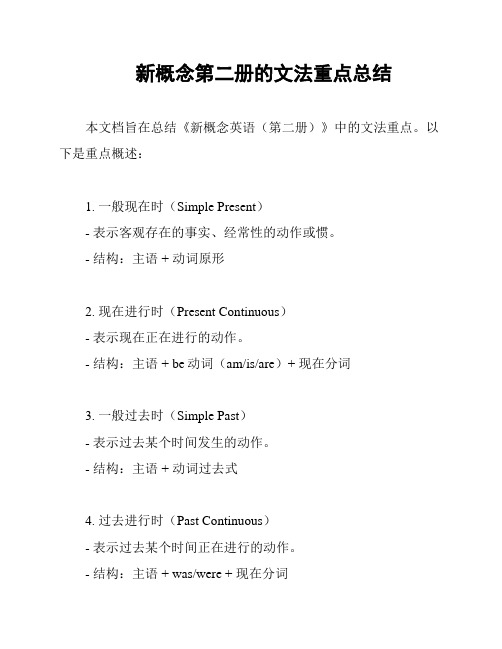
新概念第二册的文法重点总结本文档旨在总结《新概念英语(第二册)》中的文法重点。
以下是重点概述:1. 一般现在时(Simple Present)- 表示客观存在的事实、经常性的动作或惯。
- 结构:主语 + 动词原形2. 现在进行时(Present Continuous)- 表示现在正在进行的动作。
- 结构:主语 + be动词(am/is/are)+ 现在分词3. 一般过去时(Simple Past)- 表示过去某个时间发生的动作。
- 结构:主语 + 动词过去式4. 过去进行时(Past Continuous)- 表示过去某个时间正在进行的动作。
- 结构:主语 + was/were + 现在分词5. 一般将来时(Simple Future)- 表示将来将要发生的动作或情况。
- 结构:主语 + will + 动词原形6. 动词不定式(Infinitives)- 被用作主语、宾语、表语或补语的动词形式。
- 结构:to + 动词原形7. 动名词(Gerunds)- 被用作主语、宾语或表语的动词形式。
- 结构:动词原形 + -ing8. 定语从句(Relative Clauses)- 用来修饰名词或代词的句子。
- 结构:关系代词(who/whom/whose/which)+ 主句9. 状语从句(Adverbial Clauses)- 用来修饰动词、形容词或副词的从句。
- 结构:从属连词 + 主句10. 不定代词(Indefinite Pronouns)- 指代不确定或泛指的人或事物。
- 包括somebody, anybody, nobody, something, anything, nothing 等等。
以上是《新概念英语(第二册)》的文法重点总结。
希望对您的学习有所帮助。
一般将来时知识点
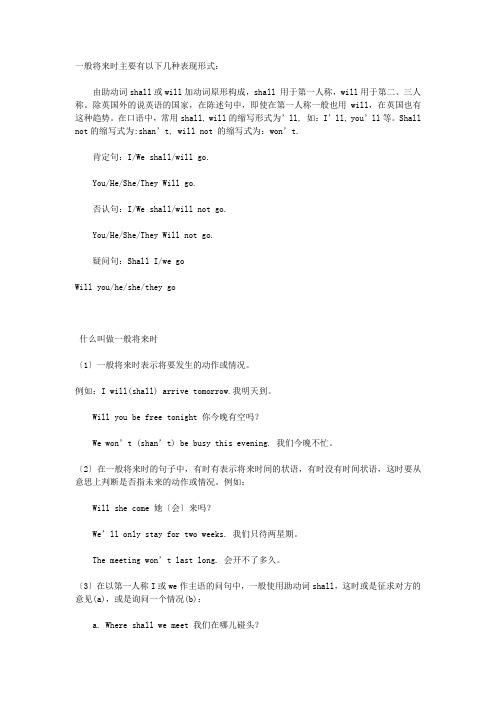
一般将来时主要有以下几种表现形式:由助动词shall或will加动词原形构成,shall 用于第一人称,will用于第二、三人称。
除英国外的说英语的国家,在陈述句中,即使在第一人称一般也用will,在英国也有这种趋势。
在口语中,常用shall, will的缩写形式为’ll, 如:I’ll, you’ll等。
Shall not的缩写式为:shan’t, will not 的缩写式为:won’t.肯定句:I/We shall/will go.You/He/She/They Will go.否认句:I/We shall/will not go.You/He/She/They Will not go.疑问句:Shall I/we goWill you/he/she/they go什么叫做一般将来时〔1〕一般将来时表示将要发生的动作或情况。
例如:I will(shall) arrive tomorrow.我明天到。
Will you be free tonight 你今晚有空吗?We won’t (shan’t) be busy this evening. 我们今晚不忙。
〔2〕在一般将来时的句子中,有时有表示将来时间的状语,有时没有时间状语,这时要从意思上判断是否指未来的动作或情况。
例如:Will she come 她〔会〕来吗?We’ll only stay for two weeks. 我们只待两星期。
The meeting won’t last long. 会开不了多久。
〔3〕在以第一人称I或we作主语的问句中,一般使用助动词shall,这时或是征求对方的意见(a),或是询问一个情况(b):a. Where shall we meet 我们在哪儿碰头?b. Shall we have any classes tomorrow明天我们有课吗?在这类问句中,近年来也有不少人用will,特别是在美国。
例如:How will I get there 我怎么去?〔4〕be going to+动词原形a.表示打算、准备做的事。
新概念英语一册语法总结
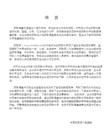
Does the dog like bones?
★变否定句在主语及动词之间加doesn’t, 动词变为原型
He doesn’t like books.
She doesn’t like him.
The dog doesn’t like bones.
★肯定回答及否定回答:
★肯定回答及否定回答
Yes, I do. No, I don’t.
Yes, we do. No, we don’t
Yes, they do. No, they don’t.
2. 现在进行时
表示现在正在进行的动作。
构成: 主语+be动词+动词的现在分词+其它成分(现在分词的构成见附录)
King Streeta year ago.
★肯定回答及否定回答
Yes, I did. No, I didn’t.
Yes, he did. No, he didn’t.
Yes, they did. No, they did not.
4. 现在完成时
构成:主语+助动词have, has+过去分词
........不含有动词的句子,即含有一般动词的句子
第三人称单数及单数名词
He likes books.
She likes him.
The dog likes bones.
★变疑问句在句首加does, 动词变为原型
Does he like books?
Does she like him?
Is he reading a book?
Is the dog running after a cat?
Are the boys swimming across the river?
新概念一语法总结
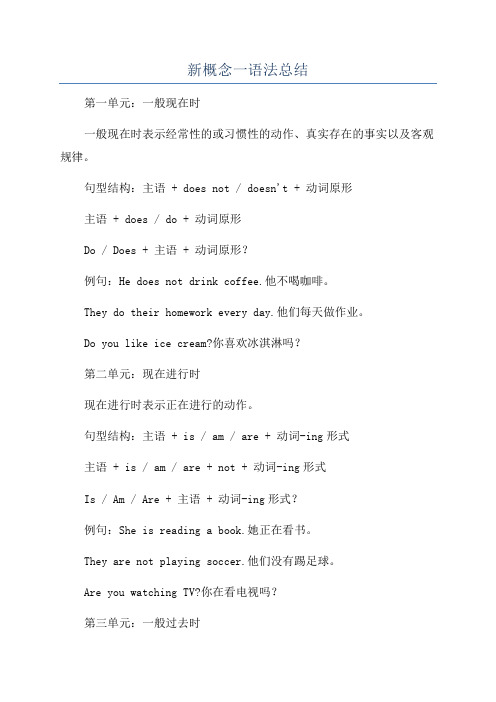
新概念一语法总结第一单元:一般现在时一般现在时表示经常性的或习惯性的动作、真实存在的事实以及客观规律。
句型结构:主语 + does not / doesn't + 动词原形主语 + does / do + 动词原形Do / Does + 主语 + 动词原形?例句:He does not drink coffee.他不喝咖啡。
They do their homework every day.他们每天做作业。
Do you like ice cream?你喜欢冰淇淋吗?第二单元:现在进行时现在进行时表示正在进行的动作。
句型结构:主语 + is / am / are + 动词-ing形式主语 + is / am / are + not + 动词-ing形式Is / Am / Are + 主语 + 动词-ing形式?例句:She is reading a book.她正在看书。
They are not playing soccer.他们没有踢足球。
Are you watching TV?你在看电视吗?第三单元:一般过去时一般过去时表示过去发生的动作或存在的状态。
句型结构:主语+动词过去式主语 + did not / didn't + 动词原形Did + 主语 + 动词原形?例句:I visited Beijing last summer.去年夏天我去了北京。
They didn't go to the party.他们没去参加聚会。
Did you see the movie?你看过这个电影吗?第四单元:过去进行时过去进行时表示过去一些时间点正在进行的动作。
句型结构:主语 + was / were + 动词-ing形式主语 + was / were + not + 动词-ing形式Was / Were + 主语 + 动词-ing形式?例句:She was cooking dinner at 6 o'clock yesterday.昨天6点她正在做饭。
新概念一语法知识点总结

新概念英语第一册语法知识点包括一般现在时,现在进行时,一般过去时,现在完成时,一般将来时,过去进行时,过去完成时,过去将来时1.一般现在时表示一般性,经常性的动作或一般性事实。
含有be动词的句子He is a teacher.The girl is very beautiful.Tim and Jack are students.★变疑问句将be动词移到句首Is he a teacher?Is the girl very beautiful?Are Tim and Jack students?★变否定句在be动词后面加notHe is not a teacher.The girl is not very beautiful.Tim and Jack are not students.★肯定回答及否定回答Yes,he is.No,he is not.Yes,she is.No,she is not.Yes,they are.No,they are not.★不含有be动词的句子,即含有一般动词的句子第三人称单数及单数名词He likes books.She likes him.The dog likes bones.★变疑问句在句首加does,动词变为原型Does he like books?Does she like him?Does the dog like bones?★变否定句在主语及动词之间加doesn’t,动词变为原型,原句中的动词不再有第三人称变化。
He doesn’t like books.She doesn’t like him.The dog doesn’t like bones.★肯定回答及否定回答:Yes,he does.No,he doesn’t.Yes,she does.No,she doesn’tYes,it does.No,it doesn’t.注意:第三人称单数形式一般在动词后面加S,不要和名词复数混淆,变否定句或疑问句时名词复数没有任何变化。
一般将来时的知识点归纳整理
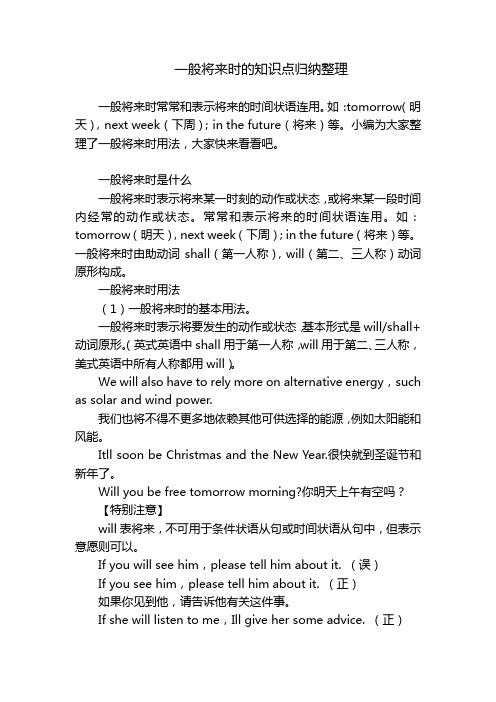
一般将来时的知识点归纳整理一般将来时常常和表示将来的时间状语连用。
如:tomorrow(明天),next week(下周);in the future(将来)等。
小编为大家整理了一般将来时用法,大家快来看看吧。
一般将来时是什么一般将来时表示将来某一时刻的动作或状态,或将来某一段时间内经常的动作或状态。
常常和表示将来的时间状语连用。
如:tomorrow(明天),next week(下周);in the future(将来)等。
一般将来时由助动词shall(第一人称),will(第二、三人称)动词原形构成。
一般将来时用法(1)一般将来时的基本用法。
一般将来时表示将要发生的动作或状态,基本形式是will/shall+动词原形。
(英式英语中shall用于第一人称,will用于第二、三人称,美式英语中所有人称都用will)。
We will also have to rely more on alternative energy,such as solar and wind power.我们也将不得不更多地依赖其他可供选择的能源,例如太阳能和风能。
Itll soon be Christmas and the New Year.很快就到圣诞节和新年了。
Will you be free tomorrow morning?你明天上午有空吗?【特别注意】will表将来,不可用于条件状语从句或时间状语从句中,但表示意愿则可以。
If you will see him,please tell him about it. (误)If you see him,please tell him about it. (正)如果你见到他,请告诉他有关这件事。
If she will listen to me,Ill give her some advice. (正)如果她愿意听我说,我会给她一些劝告。
【考试必备】常与一般将来时连用的时间状语有:next time下次tomorrow明天tomorrow evening明晚before long不久后in the future将来later(on)以后the day after tomorrow后天this afternoon今天下午next year明年(2)一般将来时的其他表达法。
新概念英语第一册语法知识点

新概念英语第一册语法总结时态:一般现在时、现在进行时、一般过去时、现在完成时、一般将来时、过去进行时、过去完成时、过去将来时1. 一般现在时★含有be动词的句子He is a teacher.The girl is very beautiful.Tim and Jack are students.★变疑问句将be动词移到句首Is he a teacherIs the girl very beautifulAre Tim and Jack students★变否定句在be动词后面加notHe is not a teacher.The girl is not very beautiful.Tim and Jack are not students.★肯定回答及否定回答Yes, he is. No, he is not.Yes, she is. No, she is not.Yes, they are. No, they are not.★含有一般动词的句子★第三人称单数及单数名词He likes books.She likes him.The dog likes bones.★变疑问句在句首加does, 动词变为原型Does he like booksDoes she like himDoes the dog like bones★变否定句在主语及动词之间加doesn’t, 动词变为原型He doesn’t like books.She doesn’t like him.The dog doesn’t like bones.★肯定回答及否定回答:Yes, he does. No, he doe sn’t.Yes, she does. No, she doesn’tYes, it does. No, it doesn’t.注意:第三人称单数形式一般在动词后面加S。
★其他人称及复数名词I want to have a bath.We have some meat.The students like smart teachers.★变疑问句在句首加doDo you want to have a bathDo we have any meatDo the students like smart teachers★变否定句在主语和动词之间加don’t.You don’t want to have a bath.We don’t have any meat.The students don’t like smart teachers.★肯定回答及否定回答Yes, I do. No, I don’t.Yes, we do. No, we don’tYes, they do. No, they don’t.构成:主语+be动词+动词的现在分词+其它成分We are having lunch.He is reading a book.The dog is running after a cat.The boys are swimming across the river.★变疑问句将be动词移到句首Are we having lunchIs he reading a bookIs the dog running after a catAre the boys swimming across the river★变否定句在be动词后面加notWe are not having lunch.He is not reading a book.The dog is not running after a cat.The boys are swimming across the river.★特殊疑问句:what, which, how, where, who, etc.疑问词+be动词+主语+现在分词What are you doingWhat is she doingWhat is the dog doing没有进行时的动词(必背)表示状态、思想、感情、感觉的动词不能表示正在进行的动作1. 表示感觉、感官的词see, hear, like, love, want2. have, has作为动词”拥有”的含义时,没有进行时常和表示过去的时间状语连用,如yesterday, last night, the day before yesterday, three days ago.含有be动词的句子,将动词变为过去式,am / is的变为was,are的变为wereI was at the butcher’s.You were a student a year ago.The teacher was very beautiful ten years ago.★变疑问句将be动词移动到句首Were you at the butcher’sWere you a student a year agoWas the teacher very beautiful ten years ago★变否定句在be动词后面加notI was not at the butcher’s.You were not a student a year ago.The teacher was not very beautiful ten years ago.★肯定回答否定回答Yes, I was. No, I was not.Yes, you were. No, you were not.Yes, he/she was. No, he/she was not.★特殊疑问句:What did you do不含有be动词的句子,将动词变为过去式,动词过去式构成见附录I finished my homework yesterday.The boy went to a restaurant.The Sawyers lived at King Streeta year ago.King Streeta year ago.★变疑问句在句首加did,动词变为原型Did you finish your homework yesterdayDid the boy go to a restaurantDid the Sawyers live at King Streeta year agoKing Streeta year ago★变否定句在主语和动词之间加did not,动词变为原型I did not finish my homework yesterday.The boy did not go to a restaurant.The Sawyers did not live at King Streeta year ago.King Streeta year ago.★肯定回答及否定回答Yes, I did. No, I didn’t.Yes, he did. No, he didn’t.Yes, they did. No, they did not.have/has+过去分词用法:1)表示过去发生且和现在有某种联系的动作,常和just, usually, already, since等时间副词连用I have just had lunch. (饱了,不用再吃了)He has had a cup of tea.(不渴了,不用再喝)They have already had their holiday. (不能再度假了)The boy has already read the book. (已经知道书的内容了,不用再看了)2)询问别人是否做过某事一般用现在完成时Have you finished your homeworkHave you been to BeijingHave he seen the film3)表示开始于过去并持续到现在的动作I have lived in Beijing for twenty years.I have worked for this school for 1 year.4)表示一种经历、经验:去过…地方,做过…事情,经历过…事情I have never had a bath.I have never seen a film.I have never been to cinema.I have ever been to Paris.Have been to表示去过,have gone to 表示去了I have been to London.(人已经回来)He has gone to London.(人还在那里)5)表示一种结果,一般不和时间副词联用I have lost my pen.I have hurt myself.He has become a teacher.She has broken my heart.句型变化:★变疑问句将助动词移到句首,变否定句在助动词后面加not.Have you lost your pen I have not lost my pen.★肯定回答及否定回答Yes, I have. No, I have not.★特殊疑问句:What have you doneWhat has he done一般过去时与现在完成时的区别:凡是有明确的表示过去的时间状语的句子为过去时注意:有些动词表示的动作有一个终点,不能再延续,因此不能和表示一段时间状语连用错:I’ve left Beijing for 3 days.对:I left Beijing 3 days ago. I have been away from being for 3 days.经常和tomorrow, next year, the day after tomorrow, the year after the next, in five hours’ time, etc. 表示将来的词联用结构:主语+助动词will+动词原形I will go to America tomorrow.The pilot will fly to Japan the month after the next.Jack will move into his new house tomorrow morning.★变疑问句将助动词移到句首Will you go to America tomorrowWill the pilot fly to Japan the month after the nextWill Jack move into his new house tomorrow morning★变否定句在助动词后面加notI will not go to America tomorrow.The pilot will not fly to Japan the month after the next.Jack will not move into his new house tomorrow morning★肯定回答及否定回答Yes, I will. No, I will not.Yes, he/she will. No, he/she will not.Yes, he will. No, he will not.★特殊疑问句:What will you do结构:had+过去分词After she had finished her homework, she went shopping.They had sold the car before I asked the price.The train had left before I arrived at the station.After/before引导的时间状语从句放在句首要在句子后面加逗号,如果放在主句后则不用。
一般将来时用法小结

一般将来时用法小结第一篇:一般将来时用法小结一般将来时用法小结:一般将来时表示在将来某个时间要发生的动作或存在的状态。
一.一般将来时的构成:1.由助动词“ shall/ will +动词原形”构成,shall 用于第一人称,will 用于第二、第三人称,2.一般将来时的否定和疑问形式:一般将来时的否定形式是will not,缩写为won't;shall not,缩写为 shan't。
一般将来时的疑问形式是把 will/ shall 提到主语前。
如:He won’t go to the park this Sunday.本周日他不去公园。
Will you go swimming with me? 和我一起去游泳好吗?二.一般将来时的基本用法:1.表示“纯粹的将来”:①表示将要发生的动作或情况,常带有表示将来的时间状语,如 tomorrow, next week, in two days, from now on 等。
如: It will be fine tomorrow.明天天气晴朗。
②表示预料将要发生的动作或情况。
如: You will feel better after having this medicine.吃了这药,你就会感觉好些的。
③表示由于习惯倾向而会经常发生的动作,本用法中的 will 要重读。
如: Boys will be boys.[谚语]男孩毕竟是男孩。
2.表示“带有情态意义的将来”,用来表示意图,用will 来表示。
如:I will be more careful next time.下次我要更加小心。
I won't go shopping this afternoon, but she will.今天下午我不想去购物,但她想去。
will 在疑问句中,用来表示有礼貌地征询对方的意见。
如:Will you have some more tea? 要不要再喝点茶?What shall we do this weekend? 本周末我们要干什么?三.一般将来时的其它几种表示法:1.用be going to 表示be going to 相当于一个助动词,与其后的动词原形一起构成句子的谓语,表示近期将要发生的动作或存在的状态如: I'm going to see a film this afternoon.今天下午我想去看电影。
- 1、下载文档前请自行甄别文档内容的完整性,平台不提供额外的编辑、内容补充、找答案等附加服务。
- 2、"仅部分预览"的文档,不可在线预览部分如存在完整性等问题,可反馈申请退款(可完整预览的文档不适用该条件!)。
- 3、如文档侵犯您的权益,请联系客服反馈,我们会尽快为您处理(人工客服工作时间:9:00-18:30)。
新概念英语语法总结:一般将来时一般将来时
——表示将来将要发生的动作,经常和tomorrow, next year, the day after tomorrow, the year after the next, in five hours' time, etc. 表示将来的词联用。
结构:主语+助动词will+动词原形
I will go to America tomorrow.
The pilot will fly to Japan the month after the next.
Jack will move into his new house tomorrow morning.
★变疑问句将助动词移到句首
Will you go to America tomorrow?
Will the pilot fly to Japan the month after the next?
Will Jack move into his new house tomorrow morning?
★变否定句在助动词后面加not
I will not go to America tomorrow.
The pilot will not fly to Japan the month after the next.
Jack will not move into his new house tomorrow morning.
★肯定回答及否定回答
Yes, I will. / No, I will not.
Yes, he/she will. / No, he/she will not.
Yes, he will. / No, he will not.
★特殊疑问句What will you do?。
